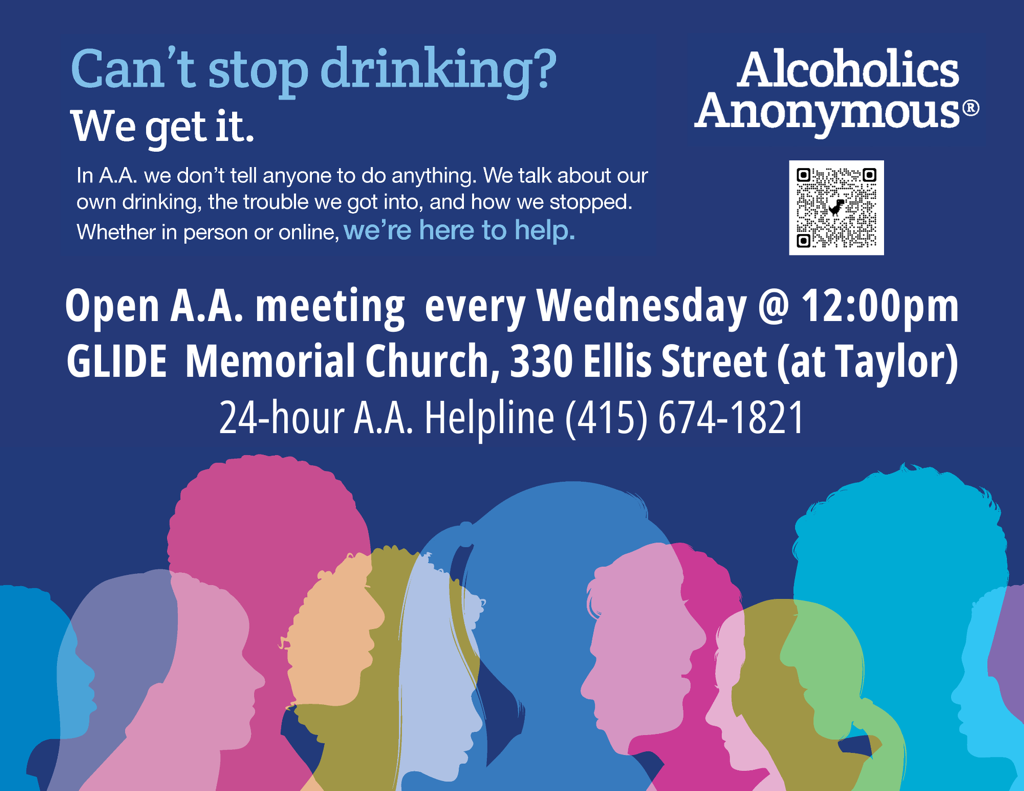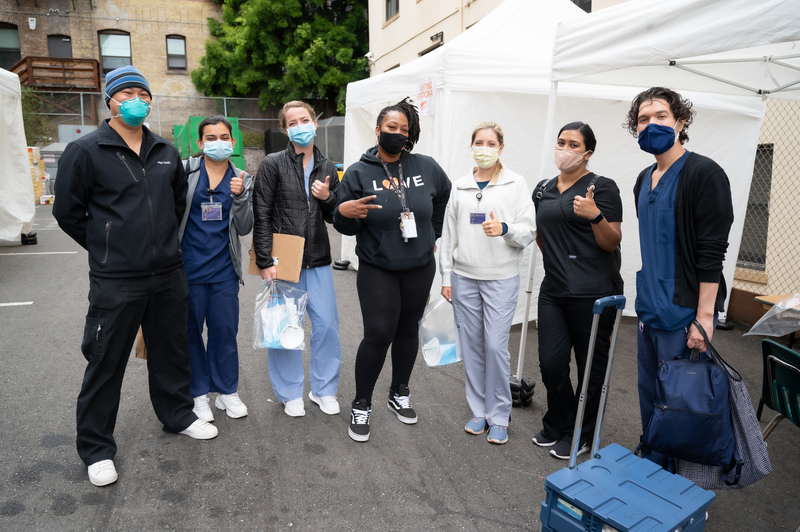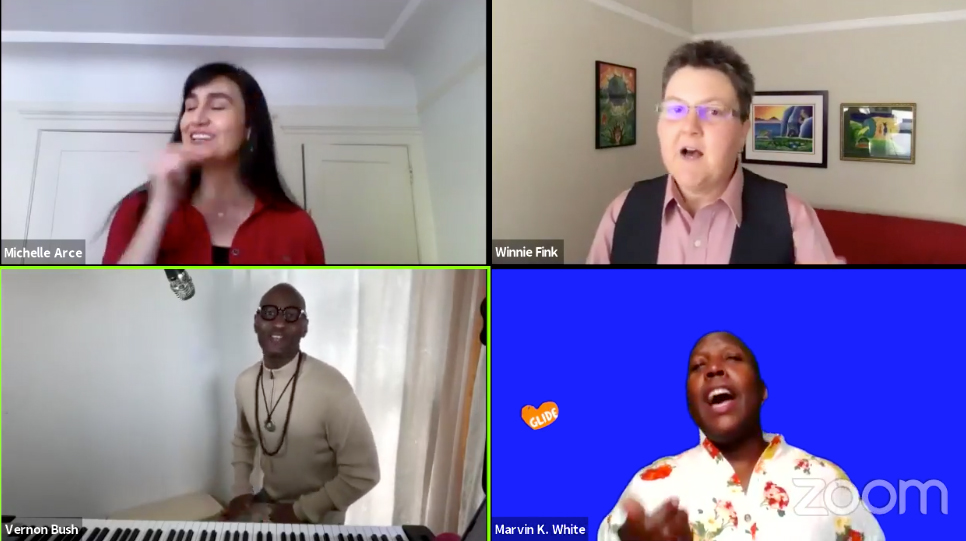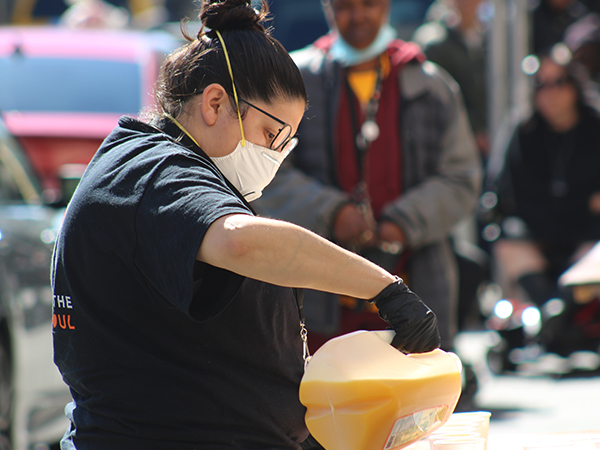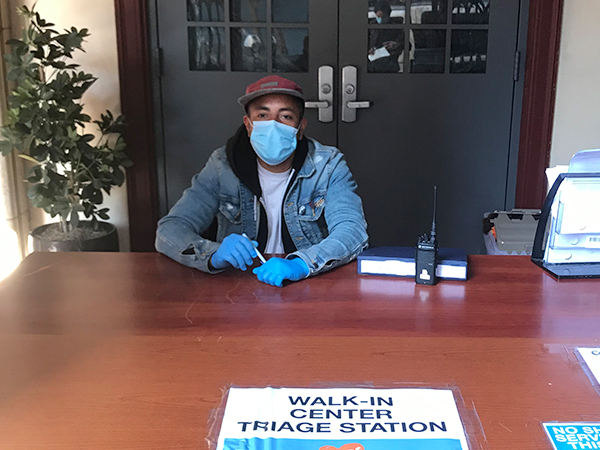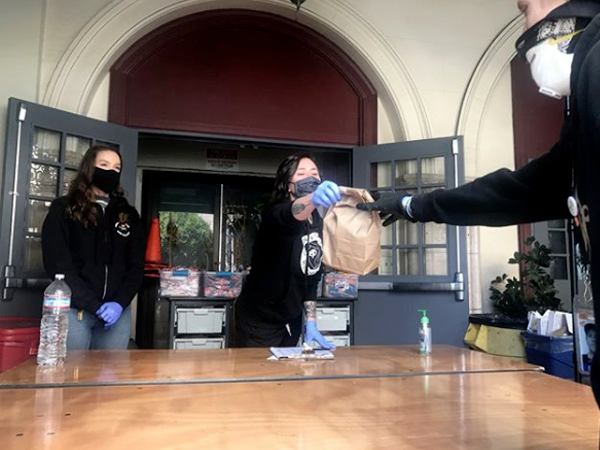Below is information on where you can go to get a vaccine until the next vaccine clinic opens again here at Glide:
https://www.vaccines.gov/search/ – COVID-19 vaccines
https://www.vaccines.gov/find-vaccines/ – Flu Vaccines
Locations to receive COVID-19 and/or flu vaccines that are free for people without insurance:
You can also call MyTurn at 1-833-422-4255 to make an appointment at a near location.
——————————————————————————————–
Vaccine clinic has the following vaccines available for FREE: (COVID-19 (Moderna and Pfizer), and MPOX)
- Clinic begins Thursdays 12pm-4pm in the new Hub (2nd container).
- Registration is available both on site Thursdays in Hub from 12pm-4pm or online( up to same day appt by 3:45pm) at CDPH-My Turn https://myturn.ca.gov/or call 1-833-422-4255. COVID-19 vaccine is available for ages 12+ no ID required but helps to fill in information. Parental Consent needed for ages 12-17(COVID-19). Vaccine clinic offers Pfizer, Moderna, MPOX and Paxlovid(Test to Treat, prescription only)FLU Vaccine available seasonally (September -April) call for updates.
List of eligibility requirements:
To Be Up To Date with Vaccines (COVID-19)-Everyone ages 6 months and older should receive an updated COVID-19 vaccine.
If Vaccinated:
- People aged 5 – 64 years
- You are up to date when you get 1 age-appropriate updated COVID-19 vaccine.
- Children aged 6 months – 4 years
- You are up to date when you get all recommended doses, including at least 1 dose of updated COVID-19 vaccine.
- People aged 65 years and older
- You are up to date when you have received 2 updated 2023–2024 COVID-19 vaccine doses.
- The second dose should be at least 4 months after the first one.
- People who got the Johnson & Johnson/Janssen COVID-19 vaccine
- You are up to date when you get 1 updated COVID-19 vaccine.
- Higher Risk
- People who are immunocompromised are up to date if they have received a 3-dose initial series that includes at least 1 updated dose and can stay up to date with 1 or more additional updated doses.
If NOT Vaccinated:
- Children aged 5 years – 11 years who are unvaccinated or have previously gotten a COVID-19 vaccine before September 12, 2023,
- get 1 updated Pfizer-BioNTech or Moderna COVID-19 vaccine.
- People aged 12 years and older who are unvaccinated should get either:
- 1 updated Pfizer-BioNTech or updated Moderna COVID-19 vaccine, OR
- 2 doses of updated Novavax COVID-19 vaccine.
- People aged 65 years and older who have not previously received any COVID-19 vaccine doses and choose to get Novavax
- get 2 doses of updated Novavax vaccine, followed by 1 additional dose of any updated 2023–2024 COVID-19 vaccine to be up to date.
- Children ages 6mos-4yrs should
- complete a multi-dose initial series that includes at least 1 dose of the updated vaccine.
Please talk to your healthcare provider if you have questions.
Talk with your health care provider to help determine whether vaccination is appropriate for you.
- MPOX:
Any person who may be at risk for MPOX infection or would like to get vaccinated may receive the MPOX vaccine.
- People who are at higher risk for MPOX or its health complications are strongly encouraged to get vaccinated to decrease the spread of MPOX and reduce the chance of serious illness or death.
Get the vaccine if you:
- Are a gay, bisexual, or other same-gender loving man who has sex with men or are transgender, gender non-binary, or gender-diverse.
- Have had sexual or intimate contact with someone who may have MPOX. Get vaccinated as soon as possible after exposure, regardless of your sexual or gender identity.
- AND if you, in the last 6 months, have had or expect to have:
- One or more sexually transmitted infections
- A weakened immune system because of another illness, like HIV
- Sexual or intimate contact with a person who is at risk of MPOX
- Anonymous sexual or intimate contact, or more than one sexual partner
Vaccine Doses:
- The vaccine is named JYNNEOS.
- You should get 2 doses of the vaccine, at least 4 weeks apart. You can choose either subcutaneous or intradermal vaccination.
- If it has been more than 4 weeks since the first dose, the second dose can be administered as soon as possible, and the series does not need to be restarted.
- If you have received your second dose, there is no need for a third dose.
Treatment:
- Most people get well from MPOX without needing any medicines or other treatment. A medication called tecovirimat (or TPOXX) may be given for people with severe MPOX. Talk to your doctor if you think you might need TPOXX.
Talk with your health care provider to help determine whether vaccination is appropriate for you.
- RSV: Not available on site, however, ask your provider if you should get vaccinated against RSV- Respiratory Syncytial Virus
- A new vaccine came out in 2023 that protects against RSV. RSV is another virus that causes illness similar to a cold. But babies and older adults can sometimes become very sick from RSV and need to be hospitalized.
- Because of this, the RSV vaccine is recommended for certain groups CDC Recommendations:
- Adults aged 60 years and older
- Adults aged 60 years and older may receive a single dose of RSV vaccine using shared clinical decision-making.
- For adults ages 60 years and older who decide with their healthcare provider to get an RSV vaccine, the best time to get vaccinated is in late summer and early fall — just before RSV usually starts to spread in the community.
- Infants and young children
To prevent severe RSV disease in infants, CDC recommends either maternal RSV vaccination or infant immunization with RSV monoclonal antibodies. Most infants will not need both.
- Vaccination for pregnant people
- 1 dose of maternal RSV vaccine during weeks 32 through 36 of pregnancy, administered September through January. Pfizer Abrysvo is the only RSV vaccine recommended during pregnancy.
- Immunization for infants and young children
- 1 dose of nirsevimab for all infants aged 8 months and younger born during or entering their first RSV season.
- 1 dose of nirsevimab for infants and children aged 8–19 months who are at increased risk for severe RSV disease and entering their second RSV season.
- Note: A different monoclonal antibody, palivizumab, is limited to children aged 24 months and younger with certain conditions that place them at high risk for severe RSV disease. It must be given once a month during RSV season. Please see AAP guidelines for palivizumab.
Talk with your health care provider to help determine whether vaccination is appropriate for you.
- If you test positive, act quickly to get medicine to prevent getting the illness from becoming serious. COVID-19 medicine is recommended for most adults and some teens.
- If you test negative and you are still feeling sick, test again in 1-2 days. People at higher risk for severe COVID-19 should contact their health care provider if they still feel sick, even if they continue to test negative. This way the provider can help decide if more evaluation is needed.
For individuals who are uninsured:
If you have Medi-Cal: Medi-Cal members have free phone visits with a doctor 24 hours a day, 7 days a week. You can get treatment by phone.
Any outside resources who provide similar services for clients, if available.
- For Testing: LAMP/PCR(nasal swab) testing has stopped at Glide and all SF testing locations.
- Glide has home test kits available(InteliSwab) for staff and community (1pp/two test per box) expires 1/31/2025 in the WIC.
- Testing is available at Vaccine clinic, during clinic hours, to support with testing on site with test kits.
- Other locations to get Rapid and PCR testing include Walgreens, CVS, or Medical Practitioner.
- Get Medi-Cal card(s) for each person in your family. Each person with a Medi-Cal card can receive up to 8 free tests each month. (https://www.cdph.ca.gov/Programs/CID/DCDC/Pages/COVID-19/How-to-Get-Tested.aspx)
- Go to a pharmacy or a store with a pharmacy.
- Go to the pharmacy counter where prescriptions are dropped off. Other registers in the store cannot provide free COVID-19 tests.
- Show your Medi-Cal card(s) and ask for 8 at-home COVID-19 antigen tests for each person.
- Test kits for those with private insurance, Medicare or Medicare Advantage. Most California insurance plans will pay or reimburse for 8 at-home test kits per month. Details are different for each plan; contact your provider for more information.
Before you throw out “expired” tests
Most at-home tests can be safely used past the date on the box. Check the test kit to see if the expiration dates have been extended on the FDA’s At-Home COVID-19 Test page.
Replace your tests with fresh ones as the extended expiration dates approach. If you have to, you can use expired tests until you can get new ones, as long as the control line is working. See your test instructions for details about the control line.
If you have any questions about COVID-19, MPOX,FLU, PAXLOVID(Test to Treat), RSV or Testing for the above viruses, talk to your healthcare provider or you can also check in with the USCF clinicians during vaccine clinic for more information.
————————————————————————————–
More information, please contact Nikki Dove #415.674.6190
